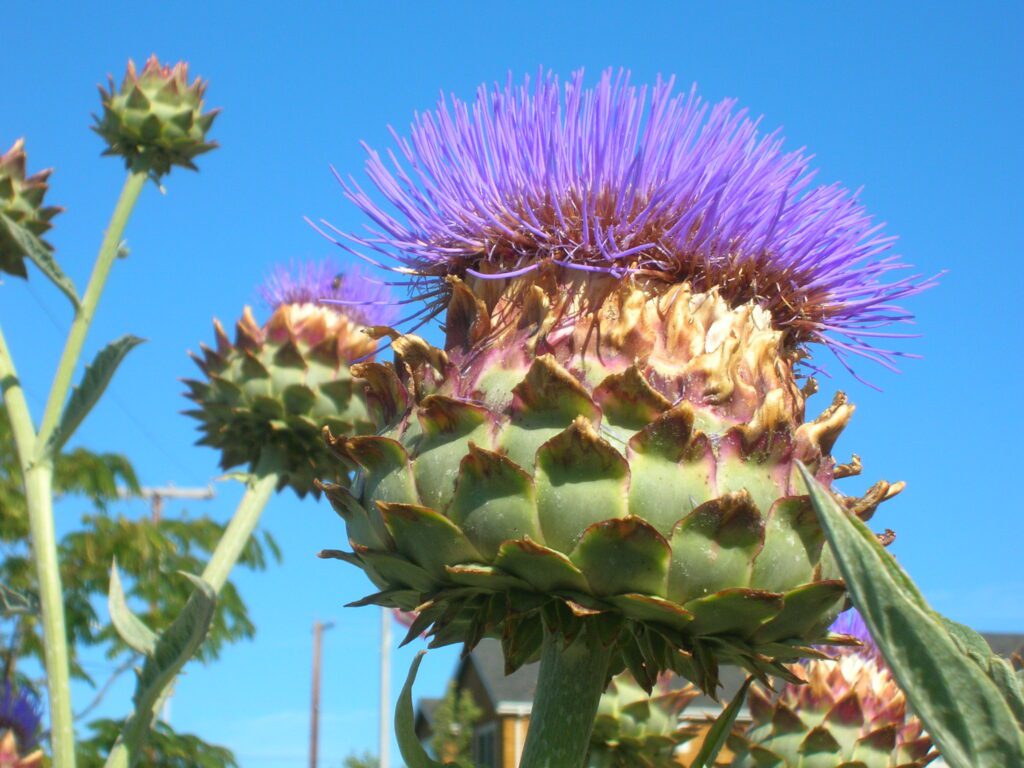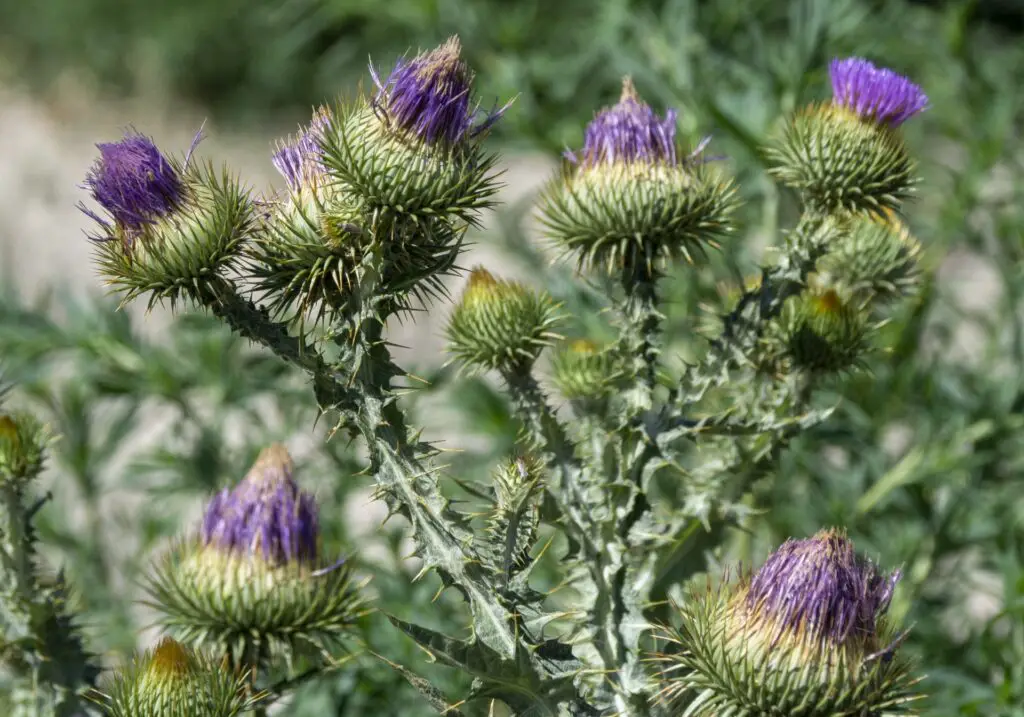As a veterinarian, I’m often asked if it’s safe for dogs to eat certain types of human food. One food that has come up recently is cardoon.
While it’s not a common food in most households, it’s often used in Mediterranean cuisine and thus may be present in some dog owners’ homes.
As pet parents, it’s understandable to want to share everything with our furry companions, but it’s important to make sure we know what’s safe and what’s not.
In this article, I’ll be discussing whether or not it’s safe for dogs to eat cardoons and what pet parents should know to keep their dogs happy and healthy.
- Can Dogs Eat Cardoon?
- How Much Cardoon Can Dogs Eat?
- How Often Can Dogs Eat Cardoon
- Health Benefits of Cardoon To Dogs
- Potential Risks of Feeding Cardoon To Dogs
- Nutritional Benefits of Cardoon For Dogs
- Are Dogs Sensitive To Cardoon?
- How To Prepare Cardoon For Dogs
- How Fast Will Dogs Digest Cardoon
- In Conclusion
Can Dogs Eat Cardoon?

Yes, dogs can safely consume boiled, steamed, roasted, and raw cardoon stalks but only in moderation.
Cardoon is a nutrient-dense vegetable that offers various health benefits, including improved digestion, heart health, and immune function.
However, it is essential to note that cardoons may affect dogs differently, and some may have digestive sensitivities that can lead to diarrhea or other problems.
Therefore, it is best to introduce cardoon to your dog’s diet gradually and in small amounts.
Additionally, you should only feed your dog cooked or boiled cardoons, as raw cardoons may be a choking hazard or contain harmful bacteria.
If you are unsure about how much cardoon to include in your dog’s diet or if your dog has any health issues, it is recommended to consult with a veterinarian first.
See also: 47 Safe Vegetables To Feed Your Dog. Puppy Power!
How Much Cardoon Can Dogs Eat?

The amount of cardoon that dogs can safely eat depends on various factors, including the dog’s size, age, overall health, and dietary requirements.
On average, dogs can consume one to two stalks of cooked or boiled cardoon per day as a treat, snack, or supplement to their regular diet.
However, it is best to introduce cardoon gradually and monitor your dog’s digestion and behavior for any adverse effects.
Additionally, you should never feed your dog raw or uncooked cardoon, as it may cause choking, digestive problems, or bacterial infections.
If you are unsure about how much cardoon to include in your dog’s diet, it is recommended to consult with a veterinarian first.
Cardoon Feeding Chart According To Size
| Food | Size | Portion |
|---|---|---|
| Cardoon | Toy dogs | 1 stalk |
| Cardoon | Small dogs | 1 stalk |
| Cardoon | Medium dogs | 2 stalks |
| Cardoon | Large Dogs | 2 stalks |
Cardoon Feeding Chart According To Age
| Food | Age | Portion |
|---|---|---|
| Cardoon | 0 – 6 months | Don’t feed |
| Cardoon | 6 – 12 months | 1 stalk |
| Cardoon | 12 – 24 months | 2 stalks |
| Cardoon | 24+ months | 2 stalks |
How Often Can Dogs Eat Cardoon
Dogs can eat cardoon occasionally as a healthy and nutritious treat or supplement to their regular diet.
However, the frequency of feeding cardoon to dogs may depend on various factors, such as the dog’s age, size, health, and dietary requirements.
In general, it is recommended to feed small to medium-sized dogs one to two stalks of cooked or boiled cardoon per day, while larger dogs may consume up to three stalks per day.
However, it is important to monitor your dog’s digestion and behavior after feeding them cardoon and adjust their diet accordingly.
If your dog has any health issues or dietary restrictions, you should consult with a veterinarian before feeding them cardoon or any other new food.
Health Benefits of Cardoon To Dogs
- Improved digestion. Cardoon is rich in fiber and natural enzymes that can aid in digestion, reduce constipation and prevent bloating and gas in dogs.
- Enhanced heart health. Cardoon is packed with potassium, an important nutrient that helps support heart function and regulates blood pressure levels in dogs.
- Boosted immune function. Cardoon is loaded with antioxidants and vitamin C, which can help strengthen your dog’s immune system, fight off infection and inflammation, and promote overall wellness.
- Reduced inflammation. The anti-inflammatory properties of cardoon can help reduce inflammation and arthritis pain in older dogs.
- Lowered cholesterol levels. Cardoon can help regulate cholesterol levels in dogs by increasing bile production and improving liver function.
- Healthier coat and skin. Cardoon has essential vitamins and minerals that can promote healthy and shiny coats and skin in dogs.
- Improved brain function. Cardoon is rich in choline, an essential nutrient that supports healthy brain function, nervous system, and cellular membrane structures in dogs.
Potential Risks of Feeding Cardoon To Dogs
- Gastrointestinal upset. Cardoon can have a laxative effect on dogs, which can lead to diarrhea, vomiting, and abdominal pain if consumed in large amounts.
- Choking hazard. Raw or uncooked cardoons can be a choking hazard for dogs due to their fibrous and tough texture. It’s best to cook or boil a cardoon before feeding it to your dog.
- Digestive sensitivities. Some dogs may have digestive sensitivities to cardoon, which can cause bloating, gas, or other digestive problems.
- Allergic reactions. Although rare, some dogs may be allergic to cardoon and show symptoms such as itchiness, hives, or swelling.
- High oxalate levels. Cardoon contains high levels of oxalates, which in excess, can cause kidney problems and bladder stones in dogs.
- Interactions with medication. Cardoon may interact with certain medications, such as blood thinners, and cause adverse effects. It’s best to consult with a veterinarian before feeding cardoon to dogs on any medication.
Nutritional Benefits of Cardoon For Dogs
| Cardoon Nutrition Facts per 100 grams | % DV * |
|---|---|
| Calories | 17 |
| Total Fat | 0.1 g |
| Cholesterol | 0 mg |
| Sugar | 0 g |
| Glycemic Index | 40 |
| Sodium | 170 mg |
| Carbs | 4.1 g |
| Protein | 0.7 g |
| Vitamin D | 0% |
| Calcium | 7% |
| Iron | 3% |
| Potassium | 400 mg |
Are Dogs Sensitive To Cardoon?
Yes. Some dogs can be sensitive to cardoon, and their reactions may vary depending on various factors, such as the dog’s size, age, overall health, and the amount and frequency of cardoon consumption.
Some of the common signs of cardoon sensitivity or intolerance in dogs may include:
- Vomiting and diarrhea
- Bloating or gas
- Lethargy or decreased activity levels
- Loss of appetite or reduced interest in food
- Skin irritation or itchiness
- Difficulty breathing or wheezing
If your dog exhibits any of these symptoms, it is recommended to stop feeding Cardoon and observe their condition for a few days. If the symptoms persist or worsen, you should contact a veterinarian immediately.
It’s best to introduce cardoon gradually and in small amounts to minimize the risk of sensitivity or digestive problems. If you have any concerns about feeding Cardoon to your dog, it is best to consult with a veterinarian first.
How To Prepare Cardoon For Dogs
Boiled and Mashed
Boil the cardoon until it’s soft, then mash it up and add it to your dog’s food. However, be sure to remove any fibrous parts and thorns before feeding them to them.
Steamed
Steam the cardoon until it’s soft and then chop it up into small pieces that can be added to their food.
Roasted
Roast the cardoon with a small amount of olive oil until it’s crispy and serve it as a treat for your dog. However, make sure to monitor how much you’re giving them as this should only be done in moderation as a treat.
How Fast Will Dogs Digest Cardoon
The speed of digestion of cardoon in dogs can vary depending on various factors, such as the dog’s size, age, overall health, and its digestive system’s efficiency.
Generally, it takes about 6 to 8 hours for a dog to digest cardoon fully.
However, this time may vary depending on the amount and frequency of cardoon consumption, as well as the individual digestive characteristics of each dog.
It is essential to introduce cardoon to your dog’s diet slowly and in small amounts to avoid digestive problems or a sudden change in their digestive system.
If you notice any signs of gastrointestinal upset, such as diarrhea, vomiting, or abdominal pain, after feeding Cardoon to your dog, it is recommended to contact a veterinarian immediately.
In Conclusion
In conclusion, dogs can safely consume cooked or boiled cardoon stalks in moderation as a healthy and nutritious supplement to their regular diet.
Cardoon offers various health benefits such as improved digestion, heart health, reduced inflammation, lower cholesterol levels, and boosted immune function.
However, dogs may react differently to cardoon, and some may have digestive sensitivities or other health issues, so it is best to consult with a veterinarian before adding any new food to your dog’s diet.
Additionally, it is essential to introduce cardoon gradually and monitor your dog’s digestion and behavior after consuming it to ensure their health and well-being.





Leave a Reply